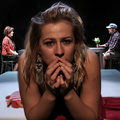
Three mighty productions stand out in the current season for their sheer ambition. While many theatres and musical venues choose to play it safe by repeating and staging what are assumed to be sure-fire hits, it is thrilling to see producers invest considerably in projects that are not at all certain to win the public’s approval. As an audience member, I applaud these efforts. I want an artistic climate where theatres feel that it is worth taking big risks. Instead of safe, boring, and predictable, the results are far more interesting.
Erkel Színház – Hugenották [Les Huguenots] For whatever reason – be it the 500th anniversary of Martin Luther’s history-changing letter – staging Meyerbeer’s epic French opera dramatizing the St. Bartholomew’s Day Massacre of 1572 is a mammoth undertaking. Director János Szikora is far more restrained here than in his fantastic production of Die Frau ohne Schatten for the Opera House a few years ago. He seems to be drawing a compromise between the requirements of traditional staging and the modern trend towards minimalism by using lavishly drawn flats interspersed with large solid word fixtures against a monochromatic black (or sometimes blinding white) background. The latter appear when he wants to stress the underlying concepts, at which point the concrete setting is unimportant, so the set pieces drift away. He is also fighting the static nature of the more old-fashioned passages, although he is more likely to move the scenery than the bodies onstage. Soon the color scheme becomes clear. Catholics are in white, and Protestants are in black, but this mostly represents the irreconcilability of their conflict. No one can recognize the other’s point of view, or even right to live. Such blind intolerance and hatred can never lead to peace, but quite easily to horrible acts of state-sanctioned mob violence. As for the performers, Gábor Bretz, though much younger than his character, steals the show in the bass role of the faithful servant Marcel. Kinga Kriszta is a flawless ingénue as Valentine. Alas, Orsolya Hajnalka Rőser lacks the training, technique, and bearing for the bel canto role of Marguerite de Valois. Boldizsár László, while visually perfect for the part of the hero Raoul, lacks credibility in the dramatic scenes. He is also forced to use a somewhat alarming head voice two or three times for the inhumanly high tenor notes. With its Grand Opera pacing, Les Huguenots does not really pick up speed until the middle of the third act, but then it becomes highly engaging. Yvette Alida Kovács deserves special praise for the lovely and numerous costumes.
Örkény István Színház – József és a testvérei [Joseph and His Brothers] One can only be astonished by talented director Ildikó Gáspár’s endeavor to adapt Thomas Mann’s novel of roughly 1,500 pages (covering Chapters 27-50 of Genesis) for the stage. With slightly less than 20 actors playing the numerous roles in the Örkény’s now trademark minimal-suggestive style, you will find yourself consulting the family tree in program again and again during the nearly five-hour running time. Given the bare-bones set, we get the impression of a lengthy, low-budget Sunday school pageant with too few, albeit uncommonly talented, performers. The theatre appears to be aiming for the ensemble style perfected by the Katona József Theatre (for example, in their 2008 production of Gorky’s Barbárok [Barbarians], coincidently also directed by Tamás Ascher). They deploy the proper actors in suitable roles and count on them to deliver the given quality. Márton Patkós provides the naivety and passion of the young Joseph, Csaba Polgár uses his riveting narrative style to hold our attention as the mature Joseph, Éva Kerekes is more than capable of embodying a sexually frustrated wife, István Ficza provides some flamboyance as a demon, and so on. Not all of the colors and styles are in proportion, but since the premiere was only in February of this year, one hopes that with more time and practice, the cast will eventually strike the perfect balance. The overall effect is that of a hall of mirrors with endlessly repeating themes and motifs stretching backwards and forwards through the generations. The accumulation of animal statues harkens back to Noah and his ark. A Thomas Mann quotation in the program even draws a connection to the very first couple, Adam and Eve. Hence, we are in search of the Grand Narrative, the roots of Western Judeo-Christian culture as we know it. No small task! As for the actors, Gabriella Hámori stands out for me. Her Rachel was so simple and timeless, she seemed to step from the pages of the Bible. László Galffi was disappointing, though, as Jacob, whose mourning over the supposed death of his favorite son Joseph provides the drama’s foundation. That pain should be sincere, not flippant and ironic.
Örkény István Színház – IV. Henrik I-II. [Henry IV, Parts 1 and 2] Presenting Shakespeare’s sprawling, problematic, and rarely performed Henry the Fourth in one evening is by no means impossible. There is plenty of fat to be trimmed, and the Örkény Theatre does an admirable job. The scenery is minimal. One constant set piece is a couch, and its changing position indicates a myriad of locales. Given the rather bland costumes, it is up to the actors to convey the milieu they inhabit, and this constantly vacillates between the highest spheres of power (the royal court), to the dens of the dregs of society (a filthy pub), and eventually to the battlefield. Most actors double, suggesting Genet’s The Balcony, where we do not know if the lower class is masquerading as the leaders or vice versa. Imre Csuja doubles as Prince Hal’s two role models: his father King Henry and the disgraced knight Falstaff. He performs this feat splendidly in his inimitably effortless and natural style.Other actors also play total opposites. Gergő Kaszás embodies the noble Lord Percy, only to appear in the second half as the psychopathic low-life Pistol. Csaba Polgár plays the macho Hotspur, then later reappears as the world-weary prostitute Doll Tearsheet. Prince Hal (eventually Henry the Fifth) is more than ably handled by Zsolt Nagy, although when he strips to his briefs, he seems a bit old to be the young prince. My only other quibble is with the characters Pistol and Hotspur. These roles seem to cry out for scenery chewing, which the Örkény’s stubbornly low-key style deliberately eschews. Overall, we receive an intelligent précis of the whole and can appreciate just how strange and puzzling a work this is. The only apparent gaps are in Hal’s monologue just before he steals the crown from his father’s death bed (his transition from enlightened philosophy to petty greed seems rushed) and Falstaff’s last encounter with the pub owner, Mistress Quickly (she calls the cops on him in the original, which is missing here). The end is abrupt, with the curtain falling on Prince Hal’s disownment of Falstaff. No comments are made. We are left to make sense of this unnerving event on our own.
A bejegyzés trackback címe:
Kommentek:
A hozzászólások a vonatkozó jogszabályok értelmében felhasználói tartalomnak minősülnek, értük a szolgáltatás technikai üzemeltetője semmilyen felelősséget nem vállal, azokat nem ellenőrzi. Kifogás esetén forduljon a blog szerkesztőjéhez. Részletek a Felhasználási feltételekben és az adatvédelmi tájékoztatóban.




